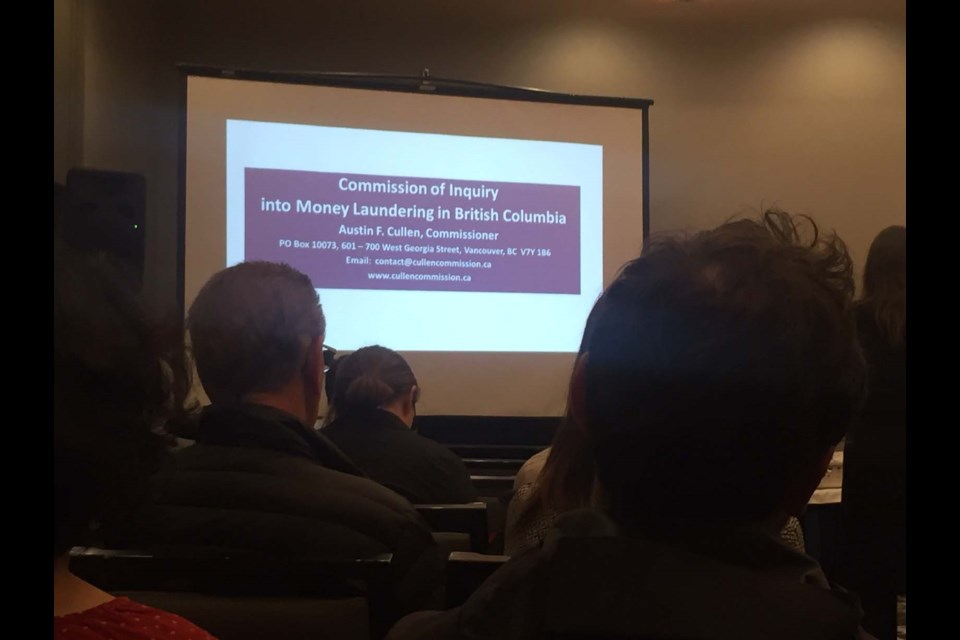Happy hour was in full swing at the Hilton hotel on Minoru Boulevard on Thursday evening, but the mood was far from jovial a few feet away in the conference room.
With the muffled tones of the resident band as back-up, one Richmond resident after another stepped up to the tell the money-laundering public inquiry commission who and what they need to investigate in the city.
The crowd of mixed ages, sex and ethnicity was slow to fill the small room for the 5:30 p.m. kick off – perhaps they were next door – but half an hour later, it was near 100-strong and standing-room only.
And although that figure sounds low, considering the gravity of the subject at hand, it was higher than previous inquiries hosted in Vancouver and Kelowna.
Before the first speaker took the mic, the inquiry’s commissioner, Austin Cullen, told how they are looking into the full scope of money laundering in the province, including real estate, gaming and financial institutions.
But Cullen also cautioned the crowd that they were not there to answer questions, adding that the evening was an “exploration and discovery process” en route making recommendations to the government next year.
First up was John Roston, who ran for city council last year, and was representing grassroots group Richmond Farmwatch, which has been keen to connect the sprawl of mansions on farmland to money-laundering.
Roston essentially made five recommendations to the commission, including: telling the B.C. government to fund an investigation into large real estate transactions, especially farmland; bring in legislation to focus on “unexplained wealth” and to seize Richmond farmland to then be leased to farmers.
He also suggested subdividing the seized farmland mansions into affordable housing, for tenant farmers.
Suzanne Jay, of the Asian Women of Equality Society, asked the commission to train its sights on the local prostitution industry which, she says is prevalent in hotels, mansions and condos.
“It’s connected to money laundering…and we’re alarmed that law enforcement is turning a blind eye (to it),” said Jay.
“Women are being sold for sex and this especially affects Asian women and colonized women. A lot of the money is likely being washed through the casinos.”
A man called “Pearly Holmes” urged Cullen to “dig deep” and “follow the money,” describing how, as part of a joint provincial investigation team in 1999, witnessed “briefcases full of cash” changing hands in the construction industry.
“Gordon Campbell (former premier) disbanded the team. Why?” asked Holmes.
“Did the BC Liberals have a connection to money laundering right from the start?”
David Chen, a Vancouver mayoral candidate and housing activist, told Cullen to shine a light into the burgeoning birth tourism industry in Richmond and beyond.
“These so-called businesses are run by cash and there increasing cases of this in Richmond.
“From freedom of information requests and public records, there were around 400 such births at Richmond Hospital (last year), that’s more than one a day.”
Over a 90-day stay (in a Richmond home set up for pre and post-natal), Chen said it would cost around $20,000 for the services provided and customers are being charged $40,000 or more.
By that rationale, Chen claimed there is in excess of $88 million in transactions taking place each year in Richmond in the birth tourism sector and an estimated $450 million across Canada
He added that an FOI uncovered $730,000 in cash transactions taking place in one year at Richmond Hospital.
“Please investigate passport babies as an industry,” he concluded.
Richmond realtor Lyn Terborg described Richmond as a “loophole society” led by a “passive council which sits back and lets this happen.”
While at the mic she also took a pop at Richmond mayor Malcolm Brodie, saying that his “eyes are likely boring into the back of my head right now.”
However, an audience member belted out that the mayor, who was in attendance earlier, had departed after the first speaker, much to the amusement of many in the room.
Meanwhile, Ivan Pak, a Richmond resident who emigrated from Hong Kong and was born in China, steered the inquiry towards the black market of underground banking.
“I talked to three recent immigrants who won’t go to a regular bank to wire money back and forth to China. They go underground banks because it’s faster and cheaper,” added Pak, who ran for school trustee last year.
“Chinese people are accused of bringing money illegally into Canada. But the Chinese government only allows you to transfer so much, so it has to be done over several years.
“Is that dirty money? People in the West don’t understand. We have to be careful how we define these transactions.”
Pak suggested officials ask people to provide proof of land transactions in China, to prove where the money is coming from.
The inquiry, which kicked off last month, moves onto Prince George next week.
The public inquiry was announced in May by Premier John Horgan, although it’s independent of government.
The commission will examine regulatory authorities and barriers to effective law enforcement of money laundering activities. Cullen has the ability to compel witnesses and order the production of documents and records.
He is required to deliver an interim report by Nov. 15, 2020 and a final report by May 2021. For more information, go online to CullenCommission.ca.



